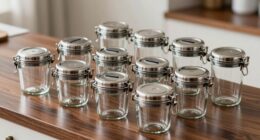I can’t emphasize enough how important it is to keep your butter maker clean and well-maintained. Trust me, neglecting this crucial task can lead to all sorts of issues down the line.
But don’t worry, with the right cleaning products and techniques, along with regular maintenance, you can ensure your butter maker lasts for years to come. Let me guide you through the ins and outs of proper cleaning and maintenance, so you can enjoy that creamy goodness without any hiccups.
Key Takeaways
- Prioritize effectiveness and safety when selecting cleaning products.
- Regularly check and replenish the lubricant according to the manufacturer’s instructions.
- Clean the butter maker after each use to prevent residue accumulation and clogging.
- Store the butter maker in a cool and dry location to prevent mold and bacteria growth.
Choosing the Right Cleaning Products
To ensure the longevity of your butter maker, it’s important for you to choose the right cleaning products. Cleaning products selection plays a crucial role in maintaining the functionality and efficiency of your butter maker.
With a wide range of options available, it can be overwhelming to find the perfect product. However, by considering a few key factors and exploring eco-friendly alternatives, you can make a well-informed decision.
When selecting cleaning products for your butter maker, it is essential to prioritize effectiveness and safety. Look for products specifically designed for removing butter residues and greasy substances. Opt for gentle yet powerful degreasers that can effectively dissolve any buildup without damaging the materials of the machine.
In addition to effectiveness, it is equally important to consider the environmental impact of the cleaning products you choose. Eco-friendly alternatives are becoming increasingly popular, as they are not only better for the planet but also for your health. Look for products that are biodegradable, free from harsh chemicals, and made from sustainable ingredients. These products not only provide a safe cleaning experience but also contribute to a healthier and greener environment.
Proper Disassembly and Cleaning Techniques
Make sure you’re using the proper techniques when disassembling and cleaning your butter maker for it to last longer. As someone who has been using butter makers for years, I understand the importance of maintaining them properly. Here are a few tips to help you with the disassembling process and cleaning tools:
-
Refer to the manual: Before starting the disassembling process, always refer to the manufacturer’s manual. It will provide you with specific instructions and precautions to follow.
-
Use the right tools: Make sure you have the necessary tools, such as a screwdriver or wrench, to disassemble your butter maker. Using the wrong tools can lead to damage or improper cleaning.
-
Clean each component thoroughly: Take your time to clean each component of the butter maker separately. Use warm, soapy water and a soft brush to remove any residue or build-up.
-
Pay attention to hard-to-reach areas: Don’t forget to clean those hard-to-reach areas, such as crevices or small openings. Use a cotton swab or toothbrush to ensure thorough cleaning.
-
Dry thoroughly before reassembling: After cleaning, make sure all the components are completely dry before reassembling the butter maker. Moisture can lead to rust or mold growth.
Regular Maintenance and Lubrication
Regular maintenance and lubrication are essential for keeping your butter maker in good working condition. By following proper lubrication techniques and troubleshooting common issues, you can ensure that your butter maker operates smoothly and efficiently.
To start, it is important to understand the lubrication requirements of your butter maker. Refer to the manufacturer’s instructions for specific lubrication points and recommended lubricants. Regularly check and replenish the lubricant to prevent excessive wear and tear.
Below is a table outlining some common lubrication points and recommended lubricants for a typical butter maker:
| Lubrication Point | Recommended Lubricant |
|---|---|
| Gears | Food-grade grease |
| Bearings | Food-grade oil |
| Moving parts | Silicone spray |
| Seals and gaskets | Food-grade silicone |
| Motor | Motor oil |
In addition to regular lubrication, it is important to troubleshoot any common issues that may arise. Some common problems include gear jamming, motor failure, or leaks. Refer to the manufacturer’s troubleshooting guide for specific solutions to these issues.
Preventing Build-up and Residue
By properly preventing build-up and residue, you can ensure the efficient operation of your butter maker. Keeping your butter maker clean and free from clogs is essential for producing high-quality butter. Here are some expert tips to help you prevent build-up and effectively remove stubborn stains:
-
Regularly clean the butter maker after each use. This will prevent any residue from accumulating and clogging the machine. Use warm, soapy water and a soft brush to scrub away any butter remnants.
-
Pay special attention to the filters and screens. These components can easily become clogged with butter particles and other debris. Remove them and clean them thoroughly to ensure proper functioning.
-
Use vinegar or lemon juice to remove stubborn stains. These natural cleaners are highly effective at breaking down grease and residue. Simply soak a cloth in vinegar or lemon juice and wipe away the stains.
-
Avoid using abrasive cleaners or harsh chemicals. These can damage the surfaces of your butter maker and leave behind harmful residues. Stick to gentle, non-abrasive cleaners to maintain the longevity of your machine.
-
Perform regular maintenance checks to identify any potential clogs or build-up. This will help you address the issue promptly and prevent any damage to the butter maker.
Storing Your Butter Maker Safely
To safely store your butter maker, ensure it is placed in a cool and dry location. Proper storage techniques are essential for maintaining the quality and longevity of your butter maker. When not in use, it is important to keep the butter maker in a safe and protected environment. This will help prevent any potential damage and ensure that it stays in optimal condition.
First and foremost, find a cool and dry spot to store your butter maker. Moisture and heat can promote the growth of mold and bacteria, which can be detrimental to the machine. Avoid placing it near any heat sources, such as stoves or ovens, as this can cause warping or melting of the components.
Additionally, it is crucial to keep the butter maker away from direct sunlight. Sunlight can cause fading and discoloration of the materials, and may also affect the functionality of the machine. Find a spot that is away from any windows or direct sunlight exposure.
Furthermore, consider using a cover or a protective case for your butter maker. This will provide an extra layer of protection against dust, dirt, and potential spills. It will also help to keep the machine free from any unwanted contaminants.
Frequently Asked Questions
Can I Use Any Type of Cleaning Product on My Butter Maker?
Sure, you can use any type of cleaning product on your butter maker, as long as it is compatible with the materials used in its construction.
However, it is important to note that some cleaning products may leave residues or odors that can affect the taste and quality of your butter.
Alternatively, you can use alternative cleaning methods such as vinegar and water solution or baking soda paste to ensure thorough cleaning without any potential negative effects.
How Often Should I Clean and Lubricate My Butter Maker?
I make sure to clean and lubricate my butter maker regularly to keep it running smoothly.
It’s important to find the right cleaning products that are compatible with the machine to avoid any damage.
As for lubrication, I usually do it once a month to ensure all the moving parts are well-maintained.
Is It Necessary to Disassemble the Butter Maker for Cleaning?
The pros and cons of disassembling the butter maker for cleaning are worth considering.
On one hand, taking it apart allows for a more thorough clean, ensuring all parts are free from residue. However, it can be time-consuming and may require technical expertise to reassemble correctly.
Alternatively, there are methods for cleaning the butter maker without disassembling, such as using hot soapy water and a brush to clean the exterior and removable components.
What Are Some Common Signs of Build-Up or Residue in the Butter Maker?
When it comes to a butter maker, it’s important to keep an eye out for signs of build-up or residue. This can include a sticky or greasy feeling on the surfaces, a change in the color or smell of the butter, or even clogged or slow-moving parts.
To prevent residue, regular cleaning is key. By removing build-up and properly maintaining the butter maker, you can ensure its longevity and keep your butter tasting fresh and delicious.
Can I Store the Butter Maker in a Humid Environment Without Causing Damage?
Yes, you can store the butter maker in a humid environment without causing damage. However, it’s important to note that humidity can have negative effects on the butter maker if not properly maintained.
High humidity levels can lead to the growth of mold and bacteria, and can also cause rusting of metal parts. To prevent these issues, make sure to clean and dry the butter maker thoroughly before storing it in a humid environment.
Regularly check for any signs of moisture buildup or damage.
Conclusion
In conclusion, taking proper care of your butter maker is essential for its longevity and optimal performance. By using the right cleaning products and following the correct disassembly and cleaning techniques, you can ensure that your butter maker remains in excellent condition.
Regular maintenance and lubrication will further enhance its lifespan. Additionally, preventing build-up and residue, as well as storing it safely, are crucial steps in maintaining your butter maker.
So, go ahead and give your butter maker the love it deserves, and watch it churn out delicious butter like never before! It’s like giving wings to your culinary creations, soaring them to buttery perfection!



